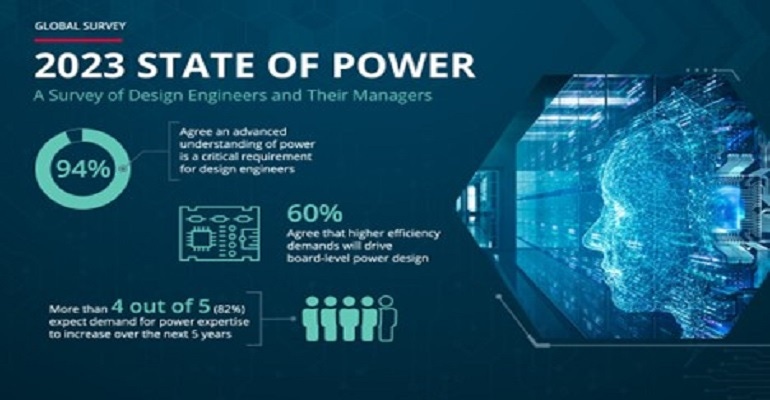Survey: Pay Attention to Power When Designing AI or Other Future Tech
Battery technology, thermal efficiency, and materials key parameters determining power systems performance.

The future of electronics lies in technologies such as AI and machine learning, electric and autonomous vehicles, robotics and industrial systems, and energy management. But there is one common requirement for these systems−power, whether it be enough to drive a data center or energy harvested power to drive tiny IoT sensors.
Toward this end, Molex, an interconnectivity and components innovator, recently conducted a global survey of 824 design engineers and managers to better understand top power system design experiences, challenges, opportunities and attitudes that are enabling or inhibiting the development of critical power-system designs. The respondents represented a variety of industries and geographies.
According to 94% of those polled, understanding how to work with power is a critical requirement, with 83% asserting power is one of their greatest design challenges. While nearly three-quarters of the participants strive to increase energy efficiency in their power system designs, more than half report simultaneously addressing efficiency, cost, capacity, and performance monitoring requirements.
Energy efficiency (73%) and functional safety (66%) were the most frequently reported design considerations, closely followed by signal and power interference (57%), battery requirements (49%), along with system and device miniaturization (47%). Addressing harsh environments (41%) and environmental noise (38%) also were cited as important priorities for system designs and implementations.
The respondents found the most daunting obstacles to be cost effectiveness (56%), safety (51%), thermal management (48%), electromagnetic interference (EMI) (45%), reliability over time (44%), power integrity (40%) and compliance (36%).
Power System Innovation
An abundance of design priorities and challenges continue to fuel the need for both custom and off-the-shelf solutions, according to 72% of those surveyed, underscoring the need for power expertise among design engineers and power-solution providers. Respondents ranked the most impactful improvements as battery performance (34%), materials advancements (30%), more efficient thermal management (29%), and battery lifetime (27%).
Also, 60% of respondents agreed that higher efficiency demands will drive power-design innovations, along with advancements in battery technology (51%), higher-power voltage consumption demands (49%), wireless connectivity (42%) and miniaturization (40%). A wide range of macro trends appear to be forcing innovations among those polled, including a shift to renewables (54%), higher functionality demands (53%) and increasing energy costs (52%).
More Power Expertise Needed
More than four in five respondents expect the demand for power expertise to increase in the next five years, with 57% reporting a significant effort is needed to better understand and comply with power-related regulatory requirements. Moreover, keeping pace with rapid changes in technologies, trends and regulations has elevated the need for hands-on experience (71%) and vendor product training (58%), as well as greater access to resources, such as software tools (61%), design reference documents (54%) and supplier customer support (52%).
Depending on geography, respondents reported different priorities. On a global scale, engineers from China reported a greater need to understand and comply with power-related regulatory requirements while also likely to leverage hands-on experience to keep pace with power innovations. Engineers based in the United Kingdom reported the most value from peer mentoring or coaching, whereas design engineers from Germany were most likely to incorporate power considerations at the initial concept phase of product development.
Spencer Chin is a Senior Editor for Design News covering the electronics beat. He has many years of experience covering developments in components, semiconductors, subsystems, power, and other facets of electronics from both a business/supply-chain and technology perspective. He can be reached at [email protected].
About the Author(s)
You May Also Like





